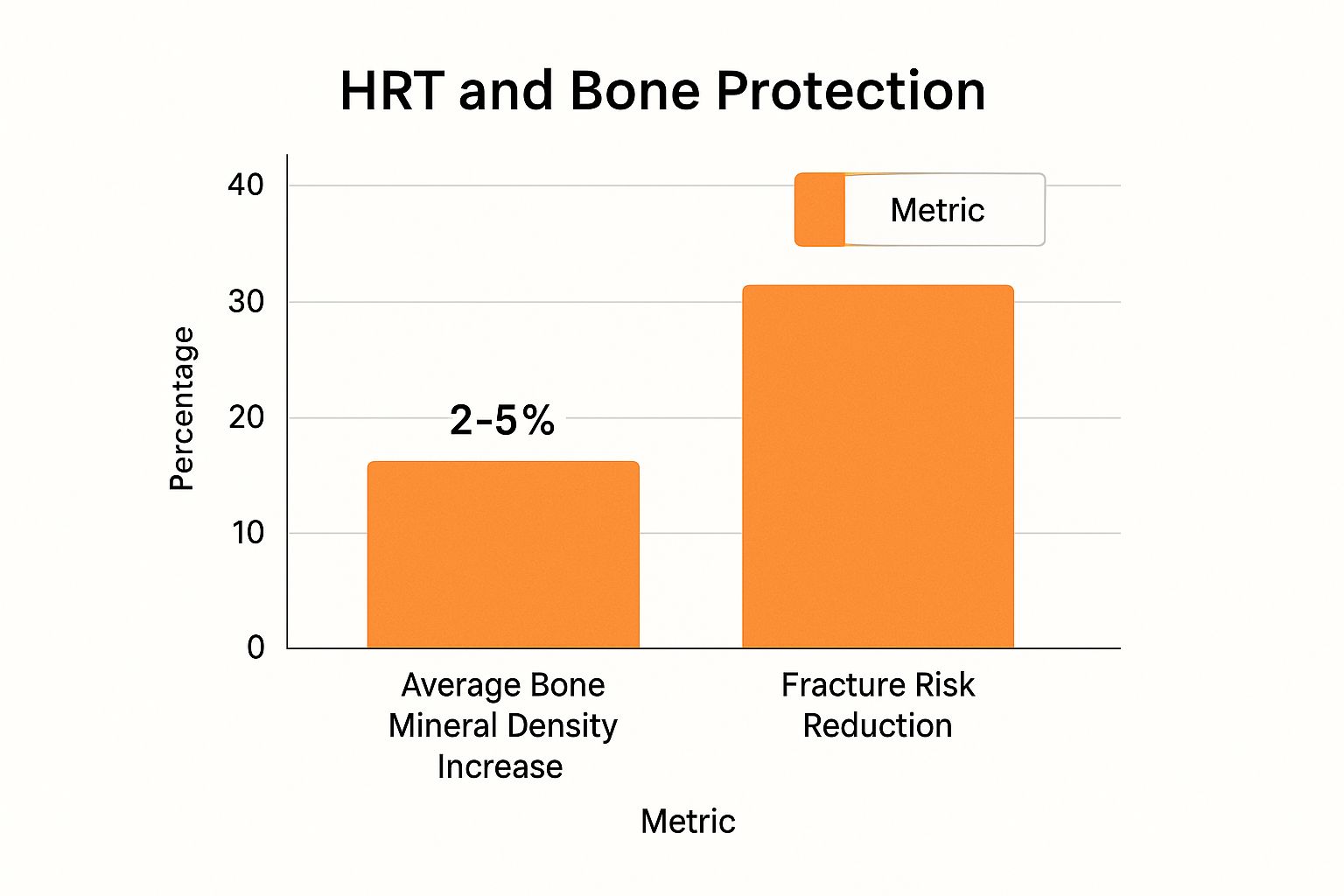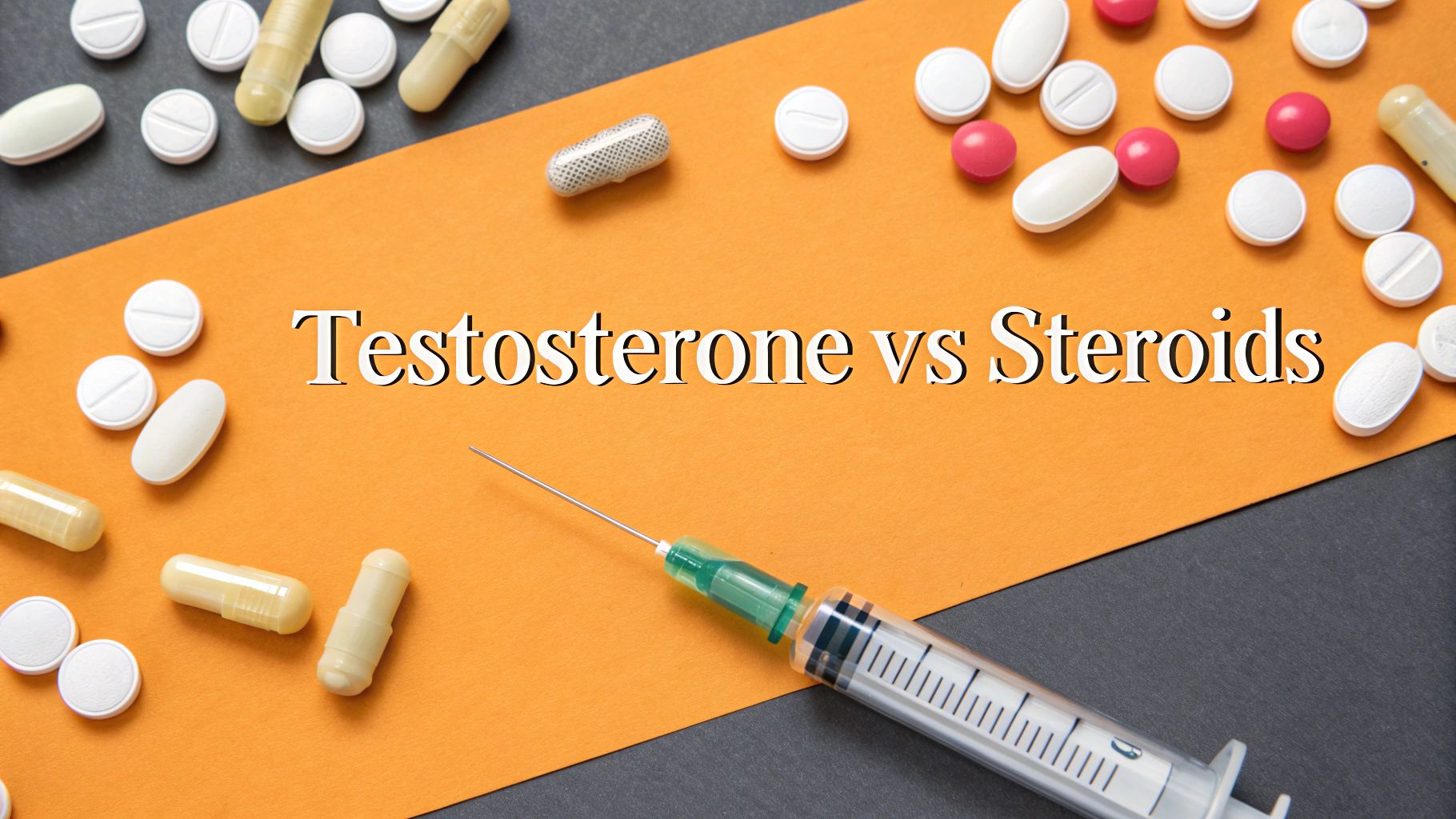Hormonal fluctuations are a natural part of life, but they don't have to dictate your daily experience or long-term health. For both men and women, declining levels of key hormones like estrogen, progesterone, and testosterone can trigger a cascade of unwelcome symptoms. These can range from persistent fatigue and disruptive 'brain fog' to diminished physical performance, emotional instability, and a noticeable loss of vitality.
While often associated primarily with menopause in women, the impact of hormonal imbalance is far-reaching, affecting everything from bone density and cardiovascular wellness to mood and cognitive sharpness in all adults. Medically supervised hormone replacement therapy (HRT) offers a direct approach to addressing these deficiencies at their source, rather than simply masking individual symptoms.
This comprehensive guide moves beyond surface-level discussions to provide a detailed roundup of the most significant hormone replacement therapy benefits. We will explore how modern, personalized treatments can help restore balance, offering a powerful tool not just for managing symptoms, but for actively optimizing your health and unlocking your full potential for years to come. From protecting your bones to enhancing mental clarity, the advantages are substantial and life-changing. Let's delve into the specific ways HRT can help you reclaim your well-being.
1. Relief from Vasomotor and Menopausal Symptoms
For many, the most immediate and life-altering of all hormone replacement therapy benefits is the profound relief from disruptive menopausal symptoms. As women approach menopause, the steep decline in estrogen production triggers a cascade of physical and emotional changes. The most prominent are vasomotor symptoms like hot flashes and night sweats, which can range from mildly annoying to completely debilitating.
Hormone replacement therapy (HRT) directly addresses the root cause by reintroducing estrogen to the body, effectively recalibrating its internal thermostat. This stabilization provides a swift reduction in both the frequency and intensity of hot flashes and night sweats, restoring comfort and enabling uninterrupted sleep. For men undergoing andropause, testosterone replacement therapy (TRT) can similarly alleviate issues with temperature dysregulation and mood instability.
How It Works in Practice
The results can be dramatic. A 52-year-old woman enduring more than ten severe hot flashes daily might find them reduced to just one or two minor warm spells after only a month of consistent HRT. Furthermore, estrogen's role in maintaining tissue health is crucial. Vaginal dryness, atrophy, and associated pain during intercourse-common complaints that significantly impact quality of life and intimacy-are often resolved. Studies show that a high percentage of women report significant improvement within just three months of starting treatment.
Key Insight: The primary goal of HRT for menopausal symptoms isn't just comfort; it's about reclaiming daily function. By stabilizing core body processes, HRT allows individuals to sleep better, feel more emotionally balanced, and maintain physical intimacy without discomfort.
Actionable Tips for Implementation
- Start Low, Go Slow: Begin with the lowest effective dose of hormones to achieve symptom relief while minimizing potential side effects.
- Keep a Symptom Diary: Track your symptoms, their severity, and timing. This data is invaluable for helping your healthcare provider fine-tune your dosage and delivery method for optimal results.
- Consider Timing: Administering progesterone at night can aid sleep, while estrogen patches provide steady, around-the-clock relief. Discuss the best timing for your specific regimen with your doctor.
- Combine with Lifestyle Changes: For synergistic effects, pair HRT with a balanced diet, regular exercise, and stress-management techniques like mindfulness or yoga.
2. Bone Density Protection and Osteoporosis Prevention
Beyond symptom relief, one of the most significant long-term hormone replacement therapy benefits is its powerful role in protecting skeletal health. After menopause, the rapid drop in estrogen accelerates bone loss, dramatically increasing a woman's risk for osteoporosis, a condition characterized by brittle bones and a high susceptibility to fractures. This "silent" disease often goes unnoticed until a fracture occurs.
Hormone replacement therapy (HRT) directly counters this process by restoring estrogen, a hormone essential for bone metabolism. Estrogen helps regulate the continuous cycle of bone breakdown (resorption by osteoclasts) and bone formation (by osteoblasts). By slowing down bone resorption, HRT helps maintain or even increase bone mineral density (BMD), preserving the strength and integrity of the skeleton for years to come.
How It Works in Practice
The protective effects are well-documented and substantial. A woman who begins HRT within five years of menopause can see a remarkable reduction in fracture risk, including a 34% lower risk of hip fractures, which are often devastating for older adults. Studies show that spinal bone density can increase by an average of 4.5% within the first two years of treatment, a significant gain that directly translates to stronger bones.
The following chart illustrates the dual impact of early HRT initiation on bone density and fracture risk.

As the data shows, HRT not only increases bone mineral density but also significantly lowers the risk of fractures, offering a comprehensive strategy for osteoporosis prevention.
Key Insight: HRT is a proactive, preventative strategy against osteoporosis, not just a treatment. By addressing the hormonal cause of bone loss at its source, it helps preserve skeletal architecture before irreversible damage and fracture risk become critical issues.
Actionable Tips for Implementation
- Consider Early Initiation: The greatest bone-protective benefits are seen when HRT is started within 10 years of menopause. Discuss timing with your provider to maximize this effect.
- Pair with Essential Nutrients: Combine HRT with adequate intake of calcium and vitamin D, the foundational building blocks for bone health. Supplementation may be necessary.
- Incorporate Weight-Bearing Exercise: Activities like walking, jogging, and strength training stimulate bone-building cells, creating a powerful synergistic effect with HRT.
- Monitor Your Progress: Regular bone density (DEXA) scans are crucial to track your BMD and ensure the treatment is effective. Your doctor will recommend a monitoring schedule.
3. Cardiovascular Health Benefits
One of the most significant, though often debated, hormone replacement therapy benefits is its potential to support long-term cardiovascular health. The connection hinges on a critical factor: timing. When initiated early in the menopausal transition, often called the "timing hypothesis," estrogen therapy can have a protective effect on the heart and blood vessels.
Estrogen plays a key role in maintaining cardiovascular wellness by improving cholesterol profiles, specifically by lowering LDL ("bad") cholesterol and raising HDL ("good") cholesterol. It also helps maintain the elasticity of blood vessel walls, promotes healthy blood flow, and reduces systemic inflammation, all of which are crucial for preventing atherosclerosis (the hardening of arteries). This benefit is not just for women; balanced hormone levels are equally important for men's cardiovascular function.
How It Works in Practice
The evidence for this benefit is compelling when treatment is started at the right time. For instance, the landmark Nurses' Health Study found that women who began HRT near the onset of menopause experienced a significant reduction in coronary events. A 55-year-old woman starting HRT within ten years of her last period may lower her risk profile considerably, whereas starting later may not confer the same protection. Furthermore, the delivery method matters; studies suggest that transdermal estrogen (patches or gels) may be associated with a lower risk of stroke compared to oral forms, as it bypasses initial metabolism in the liver.
Key Insight: The cardiovascular benefits of HRT are not universal but are tied to a "window of opportunity." Initiating therapy early in menopause allows estrogen to protect the vascular system before significant age-related damage occurs, turning a preventative measure into a powerful health strategy.
Actionable Tips for Implementation
- Start Within the "Window": The most protective effects are seen when HRT is started within 10 years of menopause or before the age of 60. Discuss your timeline with your doctor.
- Consider Transdermal Delivery: Ask your healthcare provider about transdermal estrogen (patches, gels, or sprays), which may offer a better cardiovascular safety profile compared to oral tablets.
- Assess Individual Risk: HRT is not a one-size-fits-all solution. A thorough evaluation of your personal and family history of heart disease, stroke, and blood clots is essential before beginning therapy.
- Monitor Your Health: Combine HRT with regular cardiovascular check-ups, including blood pressure monitoring and lipid panel tests, to track its effects and ensure your overall health is optimized.
4. Cognitive Function and Memory Enhancement
One of the more complex but significant hormone replacement therapy benefits involves the maintenance of cognitive function and memory. The brain is rich with hormone receptors, and declining estrogen and testosterone levels can disrupt critical neural processes. Estrogen, in particular, plays a vital role in supporting neurotransmitter activity, promoting neuroplasticity (the brain's ability to form new connections), and providing neuroprotection against cellular damage.
Hormone replacement therapy (HRT) works to counteract this cognitive decline by restoring optimal hormone levels, thereby supporting the brain's structural and functional integrity. This is not just about staving off "brain fog"; it's about preserving the very mechanisms that govern memory, focus, and verbal fluency. While the relationship is intricate and timing-dependent, evidence suggests that maintaining hormonal balance is a key pillar of long-term brain health.
How It Works in Practice
The cognitive effects can be subtle yet profound. For instance, research from prominent figures like Dr. Roberta Brinton has shown that women on HRT often demonstrate better performance on verbal memory tests. A 48-year-old woman struggling with word-finding difficulties and forgetfulness might notice a marked improvement in her mental clarity and recall after several months of therapy. Moreover, some observational studies suggest that women who start HRT early in their menopausal transition may have a significantly lower risk of developing Alzheimer's disease later in life.
Key Insight: The timing of HRT initiation is critical for cognitive benefits. The "critical window hypothesis" suggests that starting therapy close to the onset of menopause may offer a protective effect on the brain that is not seen when treatment begins many years later.
Actionable Tips for Implementation
- Discuss Timing with Your Provider: Ask your healthcare provider if you are within the "critical window" for starting HRT to maximize potential neuroprotective benefits.
- Monitor Cognitive Changes: Keep a simple log of your cognitive symptoms, noting any changes in memory, focus, or mental fog after starting treatment. This helps tailor your therapy effectively.
- Combine with a Brain-Healthy Lifestyle: Amplify the effects of HRT by engaging in regular exercise, eating a diet rich in antioxidants, getting adequate sleep, and challenging your mind with new activities. For more advanced strategies, you can learn more about how certain compounds support cognitive function in our article on peptides for brain health.
- Consider Bioidentical Hormones: Some patients and practitioners prefer bioidentical hormones as they are structurally identical to those the body produces. Discuss with your doctor if this is the right approach for your cognitive and overall health goals.
5. Skin Health and Anti-Aging Effects
Beyond internal wellness, another of the most visible hormone replacement therapy benefits is its profound impact on skin health and appearance. Estrogen is fundamental to maintaining skin integrity, influencing everything from collagen production and hydration to elasticity and thickness. As estrogen levels fall during menopause, the skin often becomes thinner, drier, and more prone to wrinkles.

Hormone replacement therapy (HRT) works to counteract these changes by restoring estrogen levels, which in turn stimulates fibroblasts, the cells responsible for producing collagen and elastin. This helps the skin retain its structural support and moisture, leading to a plumper, more youthful appearance. For men, balanced testosterone levels also contribute to optimal skin function and wound healing.
How It Works in Practice
The improvements can be quite noticeable and are supported by dermatological research. Studies have demonstrated that women on HRT can experience a significant increase in skin thickness and collagen content, with some research showing collagen improves by as much as 30% within the first few months. A 55-year-old woman might notice that her skin feels less dry and crepey, and that fine lines around her eyes and mouth appear softer after six months of consistent therapy.
Key Insight: HRT's effect on skin is not just cosmetic; it's a reflection of improved cellular health. By supporting foundational structures like collagen, HRT helps restore the skin’s functional barrier, making it more resilient and better able to retain moisture.
Actionable Tips for Implementation
- Combine with Smart Skincare: HRT is not a replacement for a good skincare routine. Pair your therapy with consistent use of sunscreen, antioxidants like Vitamin C, and retinoids to maximize anti-aging effects.
- Monitor Skin Changes: Keep a visual diary or take monthly photos to track improvements in skin texture, hydration, and fine lines. Share these observations with your provider.
- Consider Topical Options: For localized concerns, such as vaginal or facial skin dryness, topical estrogen creams can provide targeted benefits directly where they are needed most.
- Explore Synergistic Treatments: For those seeking advanced skin rejuvenation, combining HRT with other therapies can yield even greater results. You can learn more about peptides for skin health on elitebioscience.co.
6. Improved Sleep Quality and Energy Levels
Disrupted sleep is a hallmark complaint for individuals with hormonal imbalances, creating a vicious cycle of fatigue, irritability, and poor daytime performance. One of the most valued hormone replacement therapy benefits is its ability to restore restorative sleep, which directly translates to enhanced daily energy and vitality. Hormonal fluctuations are a primary driver of sleep disturbances, from night sweats that jolt you awake to the anxiety and mood swings that prevent you from falling asleep in the first place.
Hormone replacement therapy systematically targets these root causes. For women, estrogen therapy dramatically reduces or eliminates night sweats and hot flashes, allowing for uninterrupted sleep cycles. For men, optimized testosterone levels can alleviate restlessness and improve overall sleep architecture. By stabilizing the hormones that influence neurotransmitters like serotonin and dopamine, HRT also helps regulate the body’s sleep-wake cycle, leading to deeper, more consistent rest.
How It Works in Practice
The improvement can be profound. A person who previously woke up multiple times a night drenched in sweat might start sleeping through the night within weeks of starting treatment. Studies have consistently shown that HRT users report significant enhancements in sleep quality, with some research indicating an average increase of 45 minutes in deep, restorative sleep per night. This newfound rest fuels a noticeable boost in daytime energy, mental clarity, and overall productivity, breaking the cycle of exhaustion.
Key Insight: Improved sleep is not just a side benefit of HRT; it is a central mechanism for restoring overall health. Quality sleep allows the body to repair itself, consolidate memories, and regulate mood, creating a powerful ripple effect that enhances nearly every other aspect of well-being.
Actionable Tips for Implementation
- Maintain a Consistent Schedule: Take your hormones at the same time each day to maintain stable levels, which supports a regular circadian rhythm.
- Practice Good Sleep Hygiene: Complement HRT by creating a dark, cool, and quiet sleep environment. Avoid screens and heavy meals before bed to signal to your body that it’s time to wind down.
- Monitor Your Sleep Patterns: Use a journal or a sleep-tracking app to note changes in your sleep quality, duration, and any lingering disruptions. Share this data with your doctor.
- Address Other Energy Drainers: While HRT boosts energy, ensure you are not deficient in other key nutrients. For those needing an additional lift, exploring options like B-12 injections can complement your therapy. You can learn more about B-12 injections for energy to see if they are right for you.
7. Sexual Health and Libido Enhancement
A decline in sexual function and desire is a common yet deeply personal challenge associated with hormonal shifts. One of the most valued hormone replacement therapy benefits is its ability to directly counteract these changes, restoring not just physical function but also intimacy and confidence. For women, declining estrogen thins vaginal tissues, causing dryness, irritation, and pain during intercourse (dyspareunia), while for both sexes, fluctuating hormones can significantly dampen libido.
Hormone replacement therapy addresses these issues at their hormonal root. Estrogen therapy helps restore vaginal lubrication, elasticity, and tissue thickness, making intercourse comfortable and pleasurable again. Concurrently, balancing key hormones like estrogen and sometimes testosterone can reawaken sexual desire, addressing the often-frustrating disconnect between a person's emotional desire for intimacy and their body's physical response.

How It Works in Practice
The improvements can be profound and multifaceted. For instance, studies championed by experts like Dr. Susan Kellogg Spadt and organizations such as the International Society for Sexual Medicine show that up to 80% of women using local or systemic estrogen report significant relief from vaginal dryness. Furthermore, a 45-year-old woman who found intimacy painful might experience complete resolution of her symptoms, while a 55-year-old man on TRT might notice a renewed interest in sex that had been absent for years. Research indicates that overall sexual satisfaction scores can increase by an average of 40% for individuals on appropriate HRT regimens.
Key Insight: Restoring sexual health with HRT is about more than just libido. It's about restoring physical comfort, rekindling emotional connection, and affirming a vital aspect of one's identity that can be lost during menopause or andropause.
Actionable Tips for Implementation
- Consider Local Estrogen: For women whose primary symptom is vaginal dryness or pain, a low-dose local estrogen cream, ring, or tablet can provide targeted relief with minimal systemic absorption.
- Discuss Testosterone's Role: If low libido persists despite balanced estrogen levels (for women) or is the primary concern (for men), discuss the potential addition of testosterone with your provider.
- Address Relationship Factors: Open communication with your partner about these changes and the treatment process is crucial. HRT works best when supported by emotional intimacy and understanding.
- Be Patient with Libido: While physical symptoms like dryness can improve quickly, improvements in libido may be more gradual. Give the therapy and your body time to adjust over several months.
8. Mood Stabilization and Mental Health Benefits
Beyond the physical symptoms, hormonal decline profoundly impacts mental and emotional well-being. One of the most significant hormone replacement therapy benefits is the stabilization of mood and the alleviation of anxiety and depressive symptoms. Estrogen, in particular, plays a critical role in brain chemistry, influencing the production and function of key neurotransmitters like serotonin and dopamine, which are central to mood regulation.
As hormone levels fluctuate and decline during perimenopause and menopause, this delicate chemical balance is disrupted, often leading to increased irritability, anxiety, mood swings, and even clinical depression. Hormone replacement therapy (HRT) works by restoring these hormone levels, helping to re-establish neurological equilibrium. This direct biochemical intervention can provide powerful relief for those whose mental health struggles are rooted in hormonal shifts.
How It Works in Practice
The impact on mental health can be profound and measurable. For instance, studies have shown that menopausal women on HRT can see their depression scores improve by as much as 30%. Similarly, research indicates a significant reduction in anxiety symptoms for a majority of users, often within the first few months of treatment. A woman who feels constantly on edge or finds herself crying for no apparent reason may discover a renewed sense of emotional calm and control once her estrogen levels are stabilized.
Key Insight: Treating hormone-related mental health issues is about addressing the physiological cause, not just managing the symptoms. For many, HRT provides the foundational stability that allows other mental health strategies, like therapy and lifestyle changes, to be far more effective.
Actionable Tips for Implementation
- Integrate Professional Care: Work closely with both your HRT provider and a mental health professional. This collaborative approach ensures that your treatment plan addresses both the hormonal and psychological aspects of your well-being.
- Track Your Mood Diligently: Use a journal or app to monitor your mood, anxiety levels, and energy daily. This data provides crucial feedback for your doctor to assess the therapy's effectiveness and make necessary adjustments.
- Prioritize a Healthy Lifestyle: Complement HRT with practices known to support mental health. Regular exercise, a nutrient-dense diet, sufficient sleep, and mindfulness can amplify the positive effects of hormonal balance.
- Be Patient with the Process: While some may feel better quickly, it can take time for your brain chemistry to fully adapt. Give the therapy at least three months to gauge its full impact on your mental state before making major decisions about your regimen.
HRT Benefits Comparison Matrix
| Benefit | Implementation Complexity | Resource Requirements | Expected Outcomes | Ideal Use Cases | Key Advantages |
|---|---|---|---|---|---|
| Relief from Menopausal Symptoms | Moderate (requires ongoing therapy) | Hormones, symptom monitoring | Rapid symptom relief (2-4 weeks), improved quality of life | Women with severe hot flashes, night sweats | Fast symptom reduction, improves daily function |
| Bone Density Protection and Osteoporosis Prevention | Moderate to high (long-term use) | Hormones, supplements, DEXA scans | Increased bone density (2-5%), reduced fractures (30-40%) | Postmenopausal women at osteoporosis risk | Proven fracture risk reduction, cost-effective prevention |
| Cardiovascular Health Benefits | Moderate (timing critical) | Hormones, cardiovascular monitoring | Improved lipid profile, reduced heart disease risk | Early menopause, cardiovascular risk present | Reduces coronary events if started early |
| Cognitive Function and Memory Enhancement | Moderate (timing and type important) | Hormones, cognitive monitoring | Supports memory, may lower dementia risk | Women concerned with cognitive decline | Enhances mental clarity, potential dementia risk reduction |
| Skin Health and Anti-Aging Effects | Low to moderate | Hormones, skincare routines | Improved skin thickness (6-30%), elasticity, reduced wrinkles | Women seeking cosmetic skin benefits | Visible skin improvements, better hydration |
| Improved Sleep Quality and Energy Levels | Moderate | Hormones, sleep hygiene | Better sleep, increased deep sleep, higher daytime energy | Women with sleep disturbances due to menopause | Rapid sleep quality improvement, mood stabilization |
| Sexual Health and Libido Enhancement | Moderate | Hormones, possible adjunct therapies | Improved vaginal lubrication, increased libido, reduced pain | Women experiencing sexual dysfunction | Enhances intimacy, reduces intercourse pain |
| Mood Stabilization and Mental Health Benefits | Moderate (requires monitoring) | Hormones, mental health support | Reduced mood swings, anxiety, depression | Women with menopause-related mood issues | Better emotional well-being, improved stress management |
The Path Forward: Is Hormone Therapy Your Next Step?
We've explored the comprehensive landscape of hormone replacement therapy benefits, moving far beyond the outdated perception of HRT as a simple fix for hot flashes. The evidence clearly demonstrates its profound potential to fundamentally reshape the aging process. It’s a proactive strategy for not just adding years to your life, but adding life, vitality, and resilience to your years.
Recapping the powerful advantages, we've seen how personalized hormone therapy can serve as a multi-faceted tool for wellness.
- Physical Fortification: From safeguarding your bones against osteoporosis and contributing to better cardiovascular health to rejuvenating your skin's youthful elasticity.
- Mental Acuity: Enhancing cognitive function, protecting memory, and stabilizing moods to combat the anxiety and depression that can accompany hormonal shifts.
- Quality of Life: Dramatically improving sleep quality, boosting energy levels, and revitalizing sexual health and libido for a more fulfilling daily experience.
These aren't isolated improvements. They are interconnected pillars supporting a stronger, more vibrant you. Better sleep fuels clearer thinking, stable moods enhance relationships, and increased energy allows you to engage more fully in the activities you love.
Your Actionable Next Steps
The journey toward harnessing these benefits is deeply personal and requires expert guidance. It is not a "one-size-fits-all" remedy but a precise medical intervention tailored to your unique physiology and health goals.
- Self-Assessment and Goal Setting: Begin by documenting your symptoms. Use a journal to track frequency and severity of issues like poor sleep, brain fog, low energy, or mood swings. Clarify what you hope to achieve. Is your primary goal better cognitive function, enhanced physical performance, or relief from menopausal symptoms? Having clear goals will facilitate a more productive conversation with a healthcare provider.
- Seek Expert Consultation: The most critical step is to consult with a physician who specializes in hormone health. This initial consultation is not a commitment to treatment but an essential fact-finding mission. A qualified expert will review your health history, symptoms, and goals to determine if you are a suitable candidate.
- Comprehensive Lab Testing: A precise diagnosis cannot be made on symptoms alone. A comprehensive blood panel is non-negotiable. This provides the objective data needed to identify specific hormonal deficiencies and create a safe, effective treatment plan. This is the cornerstone of personalized medicine, ensuring your therapy is calibrated exactly to your body's needs.
Embracing hormone therapy is a decision to invest in your long-term healthspan. It's about taking decisive, informed action to optimize your biological function, allowing you to maintain your edge, feel your best, and live without the limitations of hormonal decline.
Ready to explore how a personalized plan can unlock these benefits for you? Elite Bioscience provides a secure, convenient telehealth platform connecting you with experienced physicians who design customized treatment plans using high-quality, lab-tested compounds. Take the first step toward reclaiming your vitality by visiting Elite Bioscience to learn more and schedule your consultation today.







